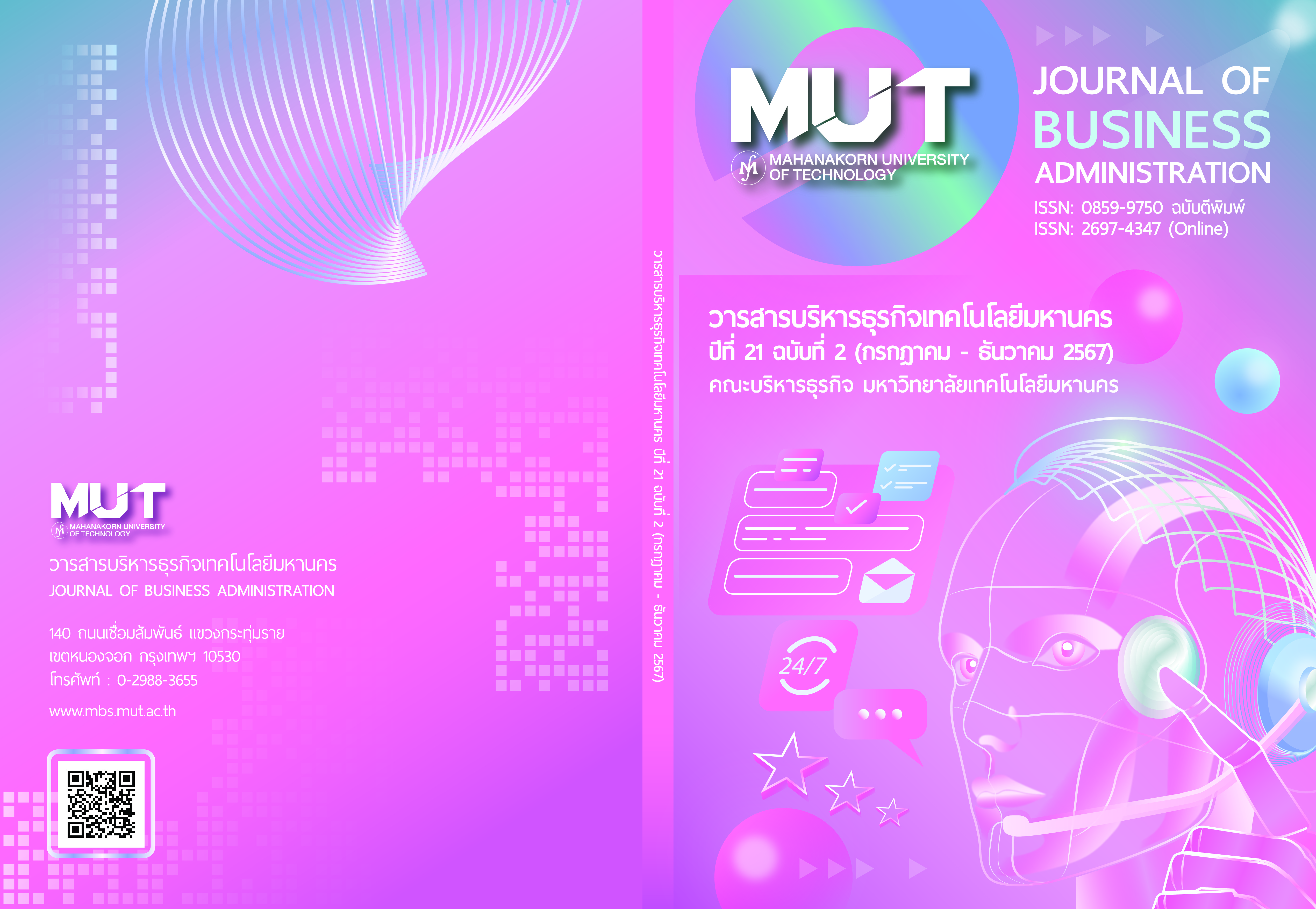อิทธิพลของคุณภาพการบริการทางอิเล็กทรอนิกส์และคุณภาพอาหารที่มีต่อความตั้งใจใช้อย่างต่อเนื่อง: บทบาทความพึงพอใจทางอิเล็กทรอนิกส์ในการส่งอาหารออนไลน์
คำสำคัญ:
คุณภาพการบริการทางอิเล็กทรอนิกส์, คุณภาพอาหาร, ความพึงพอใจทางอิเล็กทรอนิกส์, ความตั้งใจใช้อย่างต่อเนื่อง, การส่งอาหารออนไลน์บทคัดย่อ
วัตถุประสงค์ของการศึกษาครั้งนี้ คือ 1) เพื่อศึกษาอิทธิพลทางตรงของคุณภาพการบริการทางอิเล็กทรอนิกส์และคุณภาพอาหารที่มีต่อความตั้งใจใช้แอปพลิเคชันส่งอาหารอย่างต่อเนื่อง และ 2) เพื่อศึกษาอิทธิพลทางอ้อมระหว่างตัวแปรคุณภาพการบริการทางอิเล็กทรอนิกส์ คุณภาพอาหาร และความตั้งใจใช้แอปพลิเคชันส่งอาหารอย่างต่อเนื่อง ผ่านความพึงพอใจทางอิเล็กทรอนิกส์ในฐานะตัวแปรส่งผ่าน กลุ่มตัวอย่าง ได้แก่ ผู้ที่มีประสบการณ์การสั่งซื้ออาหารออนไลน์ผ่านแอปพลิเคชันอย่างน้อย 1 แอปพลิเคชัน จำนวน 721 คน ด้วยการสุ่มตัวอย่างแบบสะดวก เครื่องมือที่ใช้ศึกษา ได้แก่ แบบสอบถามออนไลน์ และวิเคราะห์ข้อมูลด้วยการวิเคราะห์องค์ประกอบเชิงยืนยันและการวิเคราะห์โมเดลสมการโครงสร้าง ผลการวิเคราะห์นี้แสดงให้เห็นว่าแบบจำลองทางทฤษฎีมีความสอดคล้องกลมกลืนกับข้อมูลเชิงประจักษ์ ผลการวิจัย พบว่า 1) คุณภาพการบริการทางอิเล็กทรอนิกส์มีอิทธิพลทางตรงต่อความตั้งใจใช้แอปพลิเคชันอย่างต่อเนื่องอย่างมีนัยสำคัญ ในขณะที่อิทธิพลของคุณภาพอาหารที่มีต่อความตั้งใจใช้แอปพลิเคชันอย่างต่อเนื่องพบว่าไม่มีนัยสำคัญ 2) คุณภาพการบริการทางอิเล็กทรอนิกส์มีอิทธิพลทางอ้อมต่อความตั้งใจใช้อย่างต่อเนื่อง โดยผ่านความพึงพอใจทางอิเล็กทรอนิกส์แบบบางส่วน และ 3) คุณภาพอาหารมีอิทธิพลทางอ้อมต่อความตั้งใจใช้อย่างต่อเนื่อง โดยผ่านความพึงพอใจทางอิเล็กทรอนิกส์แบบสมบูรณ์ การค้นพบครั้งนี้แสดงให้เห็นว่าความพึงพอใจทางอิเล็กทรอนิกส์เป็นตัวแปรที่สำคัญต่อการเชื่อมโยงไปสู่การตัดสินใจใช้แอปพลิเคชันส่งอาหารออนไลน์อย่างต่อเนื่อง
เอกสารอ้างอิง
Alalwan, A. A. 2020. Mobile food ordering apps: An empirical study of the factors affecting customer e-satisfaction and continued intention to reuse. International Journal of Information Management. Vol. 50. 28-44.
Al Amin, M., Arefin, M. S., Sultana, N., Islam, M. R., Jahan, I. and Akhtar, A. 2020. Evaluating the customers' dining attitudes, e-satisfaction and continuance intention toward mobile food ordering apps (MFOAs): evidence from Bangladesh. European Journal of Management and Business Economics. Vol 30. No. 2. 211-229.
An, S., Eck, T. and Yim, H. 2023. Understanding consumers’ acceptance intention to use mobile food delivery applications through an extended technology acceptance model. Sustainability. Vol 15. No. 1.
Anderson, J. C. and Gerbing, D. W. 1988. Structural equation modeling in Practice: A review and recommended two-step approach. Psychological Bulletin. Vol 103. 411-423.
Brislin, R. W. 1970. Back-translation for cross-culture research. Journal of Cross-Cultural Psychology. Vol. 1. No. 3. 185-216.
Cochran, W. G. 1953. Sampling Techniques. New York: John Wiley & Sons. Inc.
Eakwanit, A. and Chaisuwan, B. 2018. Factor Affecting the Purchasing Intention of Environmentally Friendly Products. Sukhothai Thammathirat Open University Journal. Vol. 32. No. 1. 125-140
Edo, J. J. R. and Hendayani, R. 2023. The Influence of E-Service Quality on Continuance Intention with Customer Satisfaction as an Intervening Variable on LinkAja Application Users in Bandung City. International Journal of Business, Management and Economics. Vol. 4. No. 2. 114-131.
Electronic Transactions Development Agency. 2024. The value of Thai e-commerce in 2023. Retrieved November 8, 2024 from
https://www.etda.or.th/th/pr-news/Dgt_ecom_survey2024.aspx.
Fornell, C. and Larcker, D. F. 1981. Evaluating structural equation models with unobservable variables and measurement error. Journal of Marketing Research. Vol. 18. No. 1. 39-50.
Ganapathi, P. and Abu-Shanab, E. A. 2020. Customer satisfaction with online food ordering portals in Qatar. International Journal of E-Services and Mobile Applications (IJESMA). Vol. 12. No. 1. 57-79.
Hair, J. F., Black, W. C., Babin, B. J. and Anderson, R. E. 2010. Multivariate data analysis: A global perspective. 7th ed. New Jersey: Pearson Prentice Hall.
Hidayat, D., Bismo, A. and Basri, A. R. 2020. The effect of food quality and service quality towards customer satisfaction and repurchase intention (case study of hot plate restaurants). Jurnal Manajemen Bisnis. Vol. 10. No. 1. 1-9.
Hussien, F. M. and Mansour, N, M. 2020. Factors Affecting Customer Satisfaction towards Mobile Food Ordering Applications (MFOAs). The Scientific Journal of the Faculty of Tourism and Hotels, Alexandria University. Vol. 17. No. 1. 17-35.
Jetsadaapichon, S., Ninsonthi, P., Pongduang, P., Innongart, K. and Niruttikul, N. 2023. Factors affecting the decision to use the Food Delivery service on the ShopeeFood application of Gen Me consumers in Chonburi. Journal of Liberal Arts and Service Industry. Vol. 6. No. 1. 341-353.
Kasikorn Research Center. 2023. Food Delivery Trend in 2023? After consumers return to normal life. Retrieved July 30, 2023 from https://www.kasikornresearch.com/th
/analysis/k-social-media/Pages/FoodDelivery-FB-05-01-2023.aspx
Kusdibyo, L. and Februadi, A. 2019. The Effect of Electronic Service Quality on Customers Satisfaction and Loyalty in Online Shopping. IOP Conference Series: Materials Science and Engineering. Vol. 662. No. 2. doi:10.1088/1757-899X/662/2/022036
Leo, G., Hurriyati, R. and Hendrayati, H. 2022. Online Food Delivery Service: The Role of e-Service Quality and Food Quality on Customer Loyalty. In: 6th Global Conference on Business, Management, and Entrepreneurship (GCBME 2021). 252-256. Atlantis Press.
Macias, W., Rodriguez, K. and Barriga, H. 2021. COVID-19 lockdown and the satisfaction with online food delivery providers. Estudios Gerenciales. Vol. 37. No. 159. 200-209.
Macias, W., Rodriguez, K. and Barriga, H. 2023. Determinants of satisfaction with online food delivery providers and their impact on restaurant brands. Journal of Hospitality and Tourism Technology. Vol. 14. No. 4. 557-587.
Mohan, D. and Kumar, N. 2018. Service Quality and Behavioral Intention: The Mediating Effect of Satisfaction in Online Food Ordering Services. DIAS TECHNOLOGY REVIEW. Vol. 15. No. 2. 29-41.
Mohd Rasli, M. A., Zulkefli, N. H., Abu Salleh, N. S., Ghani, F. A., Razali, N. A. and Raja Idris, R. S. N. 2020. Determinants of Behavioral Intention on Online Food Delivery (OFD) APPS: Extending UTAUT2 with Information Quality. Global Business and Management Research: An International Journal. Vol. 12. No. 4. 679-689.
Nam, L. G., An, T. and Thi, N. 2021. Factors affecting the continuance intention to use food delivery apps of the millennials in Ho Chi Minh city. Technium Social Sciences Journal. Vol. 18. 404-417.
National Statistical Office. 2023. The 2023 household survey on the use of information and communication technology (Quarter 4). Retrieved November 8, 2024 from https://www.nso.go.th/nsoweb/storage/survey_detail/2024/20240229135937_44161.pdf
Omar, N. A., Lahath, A., Astuti, R. D., Jamaludin, N. A. and Alam, S. S. 2023. The Mediating Role of Attitude in the Relationship Between the Extrinsic and Intrinsic Attributes of Japanese Frozen Foods and Consumers’ Intention to Purchase Them: Evidence from Malaysia. The South East Asian Journal of Management. Vol. 17. No. 1. 98-129.
Piriyakul, M., Piriyakul, R., Boonyoung, M., Piriyakul, P. and Piriyakul, I. 2016. Factor effecting intention to reuse internet transaction. Lanna Academy Journal. Vol 1. No. 1. 1-21.
Podsakoff, P. M., MacKenzie, S. B., Lee, J. -Y. and Podsakoff, N. P. 2003. Common method biases in behavioral research: A critical review of the literature and recommended remedies. Journal of Applied Psychology. Vol. 88. No. 5. 879-303.
Polpanthin, Y. 2017. The Mediating Roles: Principle and Applied. Veridian E-Journal. Vol 3. No. 11. 3433-3441.
Prasetyo, Y.T., Tanto, H., Mariyanto, M., Hanjaya, C., Young, M.N., Persada, S.F., Miraja, B.A. and Redi, A.A.N.P. 2021. Factors Affecting Customer Satisfaction and Loyalty in Online Food Delivery Service during the COVID-19 Pandemic: Its Relation with Open Innovation. Journal of Open Innovation: Technology, Marketing, and Complexity. Vol. 7. No. 76. 1-16.
Ran, L. and Li, Z. 2020. An Empirical Analysis of Continuous Use Intention in Mobile Food Delivery App Considering the Herd Behavior. Electronic Journal of Open and Distance Innovative Learning. Vol. 12. No. 2. 157-179.
Ratchatakulpat, T., Ratchatakulpat, T., Supasettaysa, G. and Ratchatakulpat, M. 2024. Factors Affecting Consumers in Making Decisions in Using Robinhood for Food Delivery in Bangkok. Community and Social Development Journal. Vol. 25. No. 2. 108-122.
Razak, F. Z. A., Mokhtar, A. E., Rahman, A. A. and Abidin, M. Z. Z. 2021. Service quality, satisfaction and users’ continuance intention to use e-campus: A mediation analysis. Journal of Physics: Conference Series. Vol. 1793. No. 1. doi:10.1088/1742-6596/1793/1/012019
Saad, A. T. 2021. Factors affecting online food delivery service in Bangladesh: an empirical study. British Food Journal. Vol. 123. No. 2. 535-550.
San, S. S. and Dastane, O. 2021. Key factors affecting intention to order online food delivery (OFD). Journal of Industrial Distribution & Business. Vol 12. No. 2. 19-27.
Shao, Z. and Ge, C. 2018. Impact of Service Quality on Individuals' Continuance Intention of the Bicycle-Sharing Application. In: 22nd Pacific Asia Conference on Information Systems, PACIS 2018, Yokohama, Japan, June 26-30, doi: https://aisel.aisnet.org/pacis2018/6
Sharma, J. K. and Kumar, N. 2019. Service quality, satisfaction and behavioral intention: Mediation and interaction analysis in electronic food ordering services. Academy of Marketing Studies Journal. Vol. 23. No. 3. 1-15.
Sidharta, S. M., Adityo, D. B., Iqbal, P. M. and Gunadi, W. (2021). Customer Loyalty Analysis on Online Food Delivery Services. Turkish Journal of Computer and Mathematics Education. Vol. 12. No. 3. 4003-4013.
Sjahroeddin, F. (2018, October). The role of ES-Qual and food quality on customer satisfaction in online food delivery service. Proceeding Industrial Research Workshop and National Seminar. Vol. 9. 551-558.
Song, Y-E., Jeon, S-H. and Jeon, M-S. 2017. The effect of mobile food delivery application usage factors on customer satisfaction and intention to reuse. Culinary Science & Hospitality Research. Vol. 23. No. 1. 37-47.
Suhartanto, D., Dean, D., Leo, G. and Triyuni, N. N. 2019A. Millennial experience with online food home delivery: A lesson from Indonesia. Interdisciplinary Journal of Information, Knowledge, and Management. Vol. 14. 277-294.
Suhartanto, D., Helmi Ali, M., Tan, K. H., Sjahroeddin, F. and Kusdibyo, L. 2019B. Loyalty toward online food delivery service: the role of e-service quality and food quality. Journal of Foodservice Business Research. Vol. 22. No. 1. 81-97.
Theerasopee, N. and Ottamakorn, C. 2019. Influence factors in the behavioral intention of the use of the web portal Thai MOOC educational system. Silpakorn University Journal. Vol. 39. No. 5. 96-116.
Triyuni, N. N., Leo, G. and Suhartanto, D. 2021. Online food delivery service: The link between food quality, e-service quality, trust, and loyalty. Advances in Engineering Research. Vol. 207. 697-702.
Wang, J., Shen, X., Huang, X. and Liu, Y. 2021. Influencing Factors of the Continuous Usage Intention of Consumers of Online Food Delivery Platform Based on an Information System Success Model. Frontiers in Psychology. Vol. 12. doi:10.3389/fpsyg.2021.716796
Wang, W. T., Ou, W. M. and Chen, W. Y. 2019. The impact of inertia and user satisfaction on the continuance intentions to use mobile communication applications: A mobile service quality perspective. International Journal of Information Management. Vol. 44. 178-193.
Yang, M., Shao, Z., Liu, Q. and Liu, C. 2017. Understanding the quality factors that influence the continuance intention of students toward participation in MOOCs. Educational Technology Research and Development. Vol. 65. 1195-1214.
Yoopetch, C., Siriphan, P. and Chirapanda, S. 2022. Determinants of Customer Satisfaction Via Online Food Delivery Applications. ABAC Journal. Vol. 42. No. 2. 70-88.
Yusra, Y. and Agus, A. 2020. The Influence of Online Food Delivery Service Quality on Customer Satisfaction and Customer Loyalty: The Role of Personal Innovativeness. Journal of Environmental Treatment Techniques. Vol. 8. No. 1. 6-12.
Zulkarnain, K., Ahasanul, H. and Selim, A. 2015. Key success factors of online food ordering services: An empirical study. Malaysian institute of Management. Vol. 50. No. 2. 19-36.
ไฟล์ประกอบ
เผยแพร่แล้ว
ฉบับ
ประเภทบทความ
สัญญาอนุญาต

อนุญาตภายใต้เงื่อนไข Creative Commons Attribution-NonCommercial-NoDerivatives 4.0 International License.
ข้อความ ข้อคิดเห็น ข้อมูล เนื้อหา รูปภาพ แผนภูมิ แผนผัง เป็นต้น ที่ปรากฏและแสดงในบทความต่างๆ ในวารสารบริหารธุรกิจเทคโนโลยีมหานคร ถือเป็นความรับผิดชอบโดยตรงของผู้เขียนบทความนั้นๆ มิใช่เป็นความรับผิดชอบใดๆ ของวารสารบริหารธุรกิจเทคโนโลยีมหานคร และมหาวิทยาลัยเทคโนโลยีมหานคร
บทความที่ตีพิมพ์ในวารสารบริหารธุรกิจเทคโนโลยีมหานคร ถือเป็นลิขสิทธิ์เฉพาะของคณะบริหารธุรกิจ มหาวิทยาลัยเทคโนโลยีมหานคร หากบุคคลหรือหน่วยงานใดต้องการนำทั้งหมดหรือส่วนใดส่วนหนึ่งไปเผยแพร่ต่อหรือเพื่อกระทำการใดๆ จะต้องได้รับการอนุญาตเป็นลายลักษณ์อักษรจากคณะบริหารธุรกิจ มหาวิทยาลัยเทคโนโลยีมหานครก่อนเท่านั้น


